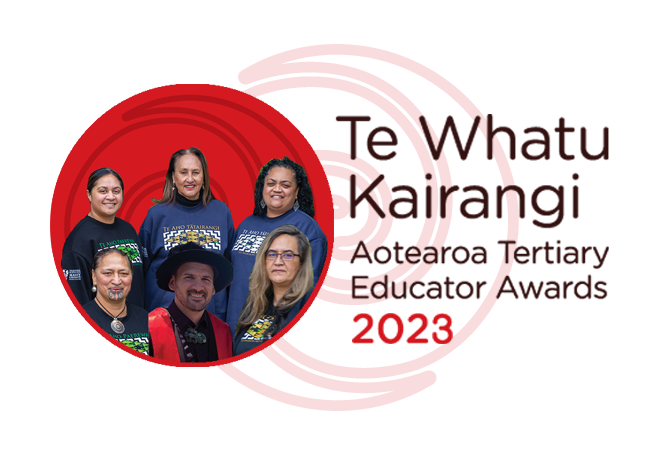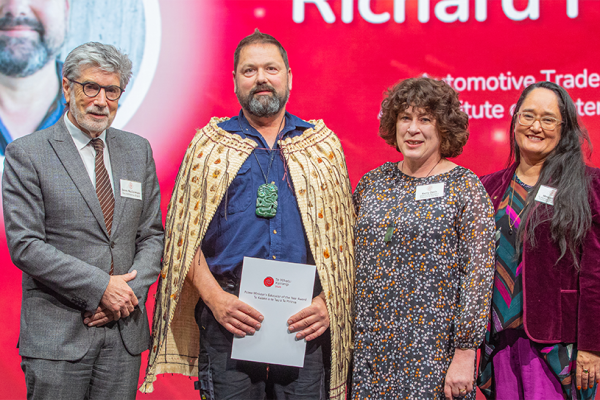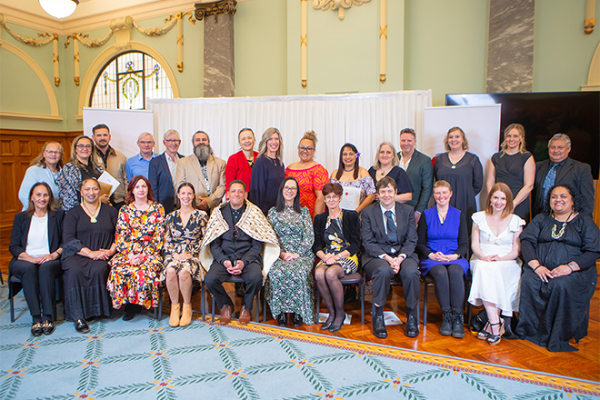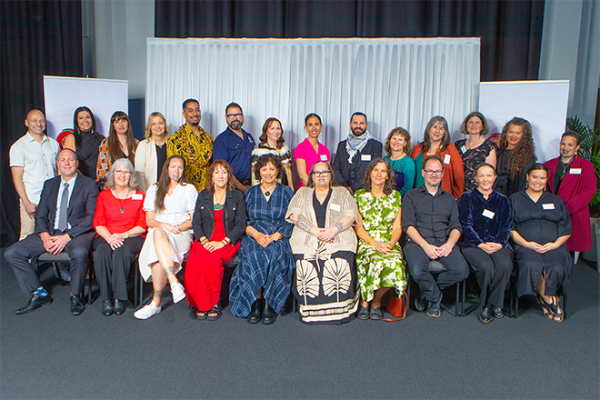Te Pūtahi-a-Toi - The School of Māori Knowledge Team
World class educators honouring Te Tiriti
Kaupapa Māori group award
Te Pūtahi-a-Toi | The School of Māori Knowledge
Te Kunenga ki Pūrehuroa | Massey University
The group includes: Professor Huia Tomlins-Jahnke, Mari Ropata-Te Hei, Nadell Karatea-Kokiri, Hona Black, Te Rina (Krystal) Warren and Rahera Filiata
Watch Te Pūtahi-a-Toi | The School of Māori Knowledge Team Teaching profile video
“Our teaching practice is informed by Te Aho Matua, currently the only philosophy and theory of teaching and learning to emerge from Aotearoa. The fundamental values and concepts inherent in Te Aho Matua are all encompassing and inclusive. Diversity and flexibility are encouraged and whānau are actively guided towards goals and aspirations that empower them and their communities to define their own destinies and those of their tamariki.”
Te Aho Tātairangi, the Bachelor of Teaching and Learning Kura Kaupapa Māori, and Te Aho Paerewa, the Postgraduate Diploma Teaching and Learning in Māori Medium, are kaupapa Māori immersion Initial Teacher Education (ITE) programmes. They are the only Te Aho Matua ITE programmes in Aotearoa and the only university-based partnership with Te Rūnanga Nui o Ngā Kura Kaupapa Māori o Aotearoa (TRN), the overarching organisation for the kura kaupapa Māori education system with legislated authority as the kaitiaki of Te Aho Matua.
The programmes are unique and internationally recognised, the only ones of their kind in the world. The programme produces outstanding Māori graduates and future leaders, enabled to effect and maintain systemic and transformational change in the kaupapa Māori sector in line with the aspirations of whānau, hapū, iwi and Māori communities.
The programmes are informed by current knowledge, experience and research in kaupapa Māori education, and the hapū and iwi-specific mātauranga that students bring. Whānau, hapū, and iwi knowledge are foundations upon which students build their skills and expertise as a kaiako for kura kaupapa Māori.
“The fundamental difference between this and other programmes is that it is taught with te aho matua at the forefront, meaning that everything is student focused not assessment focused.” (Second year student)
Māori language is the language of instruction. There has been a battle for the continuity and survival of the Māori language, and the implications of an initial teacher education programme aimed at preparing teachers for the kaupapa Māori education sector are significant. The programmes aim to prepare exceptional teachers for the nation’s te reo Māori immersion classrooms, and to ensure graduate teachers are adequately prepared to contribute to the ‘all important’ battle for the continued survival of te reo Māori.
As full immersion programmes, they build the te reo Māori proficiency of student teachers while ensuring that tribal mita (pronunciation) are not compromised. This is achieved through intensive te reo Māori learning grounded in Kaupapa Māori values and perspectives, as expressed through Te Aho Matua. The curricula include kaupapa Māori pedagogical practices that takes account of tribal variances in dialect, customs and traditions that are practised within kura kaupapa Māori, so ākonga are exposed to and supported by a range of Māori language experts, teaching professionals and linguists.
“I’m so grateful to know that there is a kaupapa like this out there that is carrying the taonga and the teachings of our ancestors.” (Second-year student)
The Te Aho teaching group has established positive relationships and deep engagement with stake-holder communities throughout Aotearoa through the partnership with TRN. This aligns directly to the specific philosophies and pedagogies of Kura Kaupapa Māori that are upheld by integrating Te Aho Matua philosophies and practices and building on the partnership with TRN.
Once selected onto the practice-based programme, Ākonga are assigned to a kura hāpai. Kura hāpai are kura kaupapa Māori who volunteer to host ākonga for the duration of their ITE studies thereby providing the benefits of a professional and whānau-centred environment. Ākonga are given access to computer and video conferencing facilities and they receive professional support from teaching staff. This arrangement is a key facet of the practice-based delivery and ensures retention of ākonga studying at a distance. Ākonga also undertake teaching placements in other kura to ensure they are provided with a variety of experiences.
Te Ao Ako, one of the key principles of Te Aho Matua, requires that teaching and learning should be a happy, stimulating and spiritual experience. Te Ao Ako is about creating a learning environment that is conducive to the learning of the ākonga.
The programme’s pedagogy and practice emphasise active learning. Students are encouraged to actively participate and reflect upon their own learning. As part of the acquisition of knowledge and skills, ākonga learning involves developing their self-awareness and self-development as kaiako within the context of kura kaupapa Māori.
Also, because the pedagogy is based on kaupapa Māori values, collaborative learning is a significant strategy employed in the courses. Collaborative learning occurs between students and lecturers, between student peers and others, through dialogue, discussion and observation. Staff and students form a collaborative unit working together to achieve student learning.
Ākonga are encouraged to take initiatives that demonstrate resourcefulness, to identify new ways to solve old problems, and to develop innovative solutions. The focus is on ākonga developing and acquiring transferable skills within a supportive environment that fosters opportunities for them to engage with applied teaching and learning experiences both within and alongside the marautanga (school curriculum).
The Te Aho programmes are designed to integrate face-to-face, online, distance, block, and other technologically enhanced learning. This blended learning approach to teaching has been exploited to ensure that the programmes are accessible to students located anywhere in the country.
Teaching teachers is demanding. Teacher educators must constantly model practices; construct powerful learning experiences; thoughtfully support progress, understanding, and practice; carefully assess students’ progress; and help link theory and practice so that graduates are ready to stand as pūkenga for their kura. The success of these programmes as exemplars for Māori education was identified in the recent Te Kura Huanui report.
“Taku ki ngā ākonga, ngā whanaunga rānei, haere, haere ki Te Aho Paerewa, ki ngā tohunga … ahakoa te tawhiti he pai kia puta i te kāinga, ētehi wā ka ngahoro koe ki roto i ngā mahi o te kāinga, ... i ēnei rā tonu ka pānui tonu au i ngā pukapuka rā, i whakamiharo atu nei i au i ngā rauemi i tukuna koutou ki a mātou, atu i ērā momo āhuatanga, ko te whanaungatanga waenganui i a mātou ko ngā kaiako o Te aho Paerewa, i tino awhina, i marama ana ki ngā kaupapa o te kāinga.” (Feedback from a graduate, now an assistant principal who recently designed and opened their own kura in Kaitaia)
The Te Aho programmes give expression to the provisions of Te Tiriti o Waitangi and Te Aho Matua provides a critical philosophical approach to education that is beneficial for tamariki Māori. The programmes and the partnership with Te Rūnanga Nui o Ngā Kura Kaupapa Māori are unique in Aotearoa and is a model for global Indigenous education. The impact of students on tamariki Māori, on the future of te reo Māori, and on Aotearoa, cannot be underestimated.



